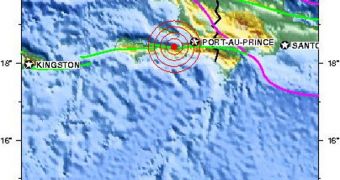The impoverished nation of Haiti was again stricken by a powerful earthquake today, January 20, at 06:03:44 AM epicenter time (11:03:44 UTC). With emergency response teams from around the world already on site in Port-au-Prince, as well as in other areas of the country that were strongly affected by the January 12 devastation, it is still unclear what the damage of the new, 6.1-magnitude tremor is. Correspondents for major media outlets in Haiti have yet to provide the public with a clear view of how things are looking up. But early reports suggest widespread panic in the streets of the Haitian capital.
According to data immediately made available by the US Geological Survey (USGS), the new earthquake, which was most likely an aftershock to the first 7.0-magnitude one, struck about 60 kilometers (35 miles) West-Southwest of the capital city of Port-au-Prince. The same agency reports that the epicenter was at a depth of 9.9 kilometers (6.2 miles), which is a little deeper than the first tremor. However, it is likely that the damage caused by the new seismic event will be just as widespread as the devastation caused by the earlier one, because the buildings that endured the January 12 event already had their internal structure precariously weakened by the powerful ground shakes.
The US National Oceanic and Atmospheric Administration (NOAA) said a short time ago, in an official statement, that the parameters of the strong tremor that just took place (location, and magnitude), as well as the historic tsunami records of the area did not warrant any tsunami alert for Puerto Rico, the Virgin Islands, the US Atlantic and Gulf of Mexico states, or for Eastern Canadian provinces.
The tremor couldn't have come at a worse time for Haiti, as the country is not only battling the massive devastation caused by the January 12 event, but also decades of poverty, and constant destruction caused by powerful hurricane seasons. The faith of the rescue workers, flown into Haiti from the US, the European Union, Asia, and countless other states, is still uncertain. Numerous non-governmental organizations (NGO) such as the Red Cross, and UN groups including UNICEF also had personnel dispatched to assist with rescue efforts.
The initial seismic event killed about 200,000 Haitians, injured more than a quarter of a million, and left about 1.5 million people without homes, food, electricity, medicine, or potable water. As the dust settles over this morning's events, the international community will need to take a step back and reassess the situation, before sending additional relief materials and manpower into the region. Hopefully, the Port-au-Prince airport, the only gateway into the country for nations halfway around the world, is still opened for airplanes.

 14 DAY TRIAL //
14 DAY TRIAL //